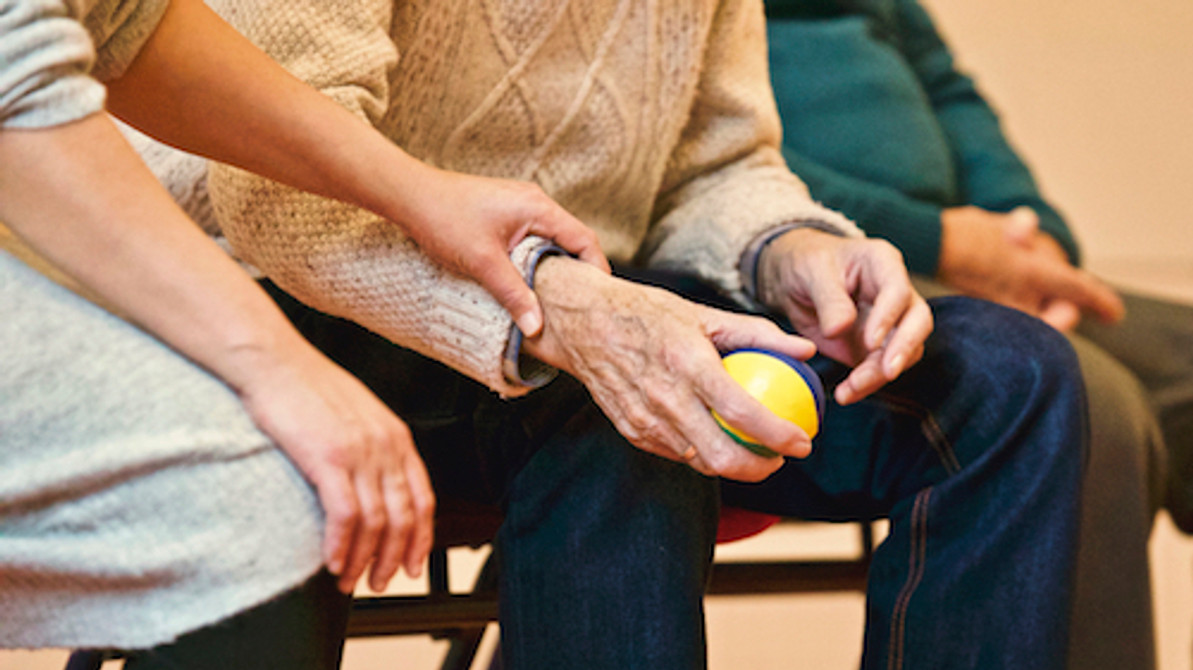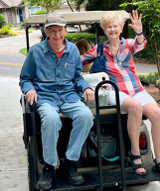The Dad’s Group
It was Tuesday morning, May 23, 2004; the time was 7:00 a.m. The first dad arrived and seated himself at a corner table in the coffee shop of an Indianapolis hotel. A second dad walked into the room, saw the person he was looking for and sat down at the same table. A third dad entered saw the other two and pulled up a chair. Although the three dads had met before, they didn’t really know each other.
Jerry’s son, Jason, had died just one week after 9/11, and for a couple of months he had attended a grief group composed of several women and one other man, but he found he was not able to express himself adequately in that group. Mark had lost his son, Nick, in 2003 and had also attended a grief group of women and men the following year, but he, too, was not comfortable in sharing what he was going through in that setting. In the spring of 1996, on my birthday and on the eve of Mother’s Day, I had lost my daughter, Bonnie. (See The Last Goodbye in the April/May/June 2005 issue of Grief Digest magazine).
All of us had met before at St. Luke’s United Methodist Church in Indianapolis. I met Jerry at a Sunday morning service where I had spoken on the theme, God Works for Good in Everything, and had included the story of Bonnie’s death. I met Mark at church during the fall of 2003. However, it was Marsha Hutchinson who brought us all together. She had led a grief group at St. Luke’s to which both Jerry and Mark had come, but since neither of them had shared deeply of themselves in those groups, Marsha wanted them to meet me, so we could tell our stories to each other.
The three of us met with Marsha the next Sunday afternoon at church. After sharing our stories briefly, we found we really could connect with each other. Marsha asked if we wanted to meet again, without her. We weren’t sure we wanted to meet at church, but when it was suggested that we meet for breakfast on the way to work, heads nodded. We agreed to meet the following Tuesday morning at a local hotel’s coffee shop that was convenient to all three.
We exchanged greetings, ordered coffee, and began talking and listening—learning more about each other as we tried to figure out what we were really doing, and why we were doing it. The connection between us deepened that morning, and the realization that kept surfacing for each of us was, “Wow! You guys really get it!” It was such a remarkable time we decided to meet again the following Tuesday at the same table, in the same coffee shop. We continued to meet, week after week after week.
Before long, we shared who we were with our server in the coffee shop, Lori Carver. Her genuine smile and her caring presence made it easy to let her know that we were dads who had lost an adult son or a daughter. And her empathetic response encouraged further conversation; she seemed to understand what we were trying to do.
Eventually, information about this group spread to others as well, especially family members and close friends. It wasn’t long before the group broadened beyond members of St. Luke’s. Two other dads joined the group in the summer of 2004. Each time a new dad joined the group, the “old” dads retold their stories and then listened to the story of the “new” dad. By that fall, three additional dads had joined the group. By word of mouth, the group grew quickly. In the spring of 2005, two more dads came. Now, there were now ten regular attendees on Tuesday mornings. It was uncommon for a bereaved dad to visit the group and not continue coming. In the fall of 2005, three new dads came.
By that time, two tables had been placed together to accommodate the group, because the idea of sitting at separate tables had been discussed and quickly declined. The dads wanted to be part of one group. Seating became even more challenging as time went on, because in the spring of 2006, three more dads showed up, including one who had to drive over an hour to get to the coffee shop! On some Tuesday mornings a third table had to be added, particularly when virtually everyone was present. This configuration continued with more regularity when two additional dads joined the group in 2007.
Lori continued to be our server throughout that time. When dads were in deep conversation with each other, she would not interrupt to take orders; she would patiently wait, or leave and return a few minutes later. As a result she became a real friend to the dads. When she became pregnant, she endeared herself to the group even more, because she was carrying a new life while these dads were grieving the loss of a life. On a Tuesday morning in August, 2005, the Dad’s Group gave her a gift card to celebrate the birth of her child. She was so surprised and touched, that tears welled up in her eyes, as they also did in the eyes of many of the fathers.
Lori was, and still is, a special person to the Dad’s Group! On one occasion she was heard saying, “I can tell there is a deep bond between you guys.” She sensed this in part because she had observed the group, but she also sensed it because she had developed her own bond with the dads. At each Tuesday closest to Christmas she would leave a card on the table with the envelope addressed to “My guys.”
Eventually, Lori accepted a position in management, and she was no longer there on Tuesday mornings. She was truly missed. She had become such an integral part of the group. In September 2007, on her last day to work as a server, she was overwhelmed by the large amount of cash that was in the card she was given. She walked around the circle, hugged each dad, even the last two whom she hardly knew. She wasn’t going to leave anyone out.
Over the years, as the group evolved, sharing deepened and broadened. Feelings of all sorts were disclosed, including tears as expressions of profound anguish and pain. It was okay for these men to show their emotions in this setting, because this was a safe place. Over time, other feelings surfaced as well. In the beginning there were few smiles and almost no laughter, but laughter began to interject itself, and eventually the entire group could laugh together. One dad even said, “This is the only group where I can really laugh.”
At first, there was so much to explain regarding the tragedies each dad had experienced. And every time a new dad showed up, every dad told the story of his son’s or daughter’s death. As a result, the dads heard each other’s stories many times, and they began to notice that some of the stories were modified as candor increased and additional details came to light. Dads even helped each other clarify their stories as they made comments and asked questions.
Throughout this process, there was no individual leader of the group. Initially, the first three dads provided leadership, but the group evolved in such a way that leadership became collaborative. The group was never dependent on any one dad to lead.
The Dad’s Group believes and practices that there are no rules in the group other than to show up. That was it—just show up! There were no other requirements, though there were some unspoken expectations that emerged:
• Share only what you want to share.
• Speak or be quiet, according to the mood you are in.
• Give all who want to talk the opportunity to do so.
• Be ready to listen with your heart as well as your head.
• Know that you are cared for by the other dads in the group.
On some Tuesday mornings, the dads go around the circle to get caught up with each other on a wide variety of topics, including family matters, job related celebrations or concerns, scores in recent golf tournaments, or experiences on trips out of town. On other mornings the conversation may be sports, politics, religion, personal stories, even jokes—some of which are great and others that are tolerated. There are also many email exchanges throughout the week. When dads leave, either individually or as a group, they often hug each other, give and receive words of encouragement, or make plans to get together by twos or larger groups for other activities.
Hope keeps on surfacing in the group: hope to just make it through another day, hope to get through the difficult times (birth days, death days, and holidays), hope to find strength to go on, hope that more family members and friends will “get it,” hope that meaning will be reconstructed, hope that good will come out of tragedy. The dads often provide that hope for each other, and when one is lacking or wavering, others in the group often become his source of hope.
Trust also continues to emerge, as does sensitivity, compassion and caring, but these qualities have taken time to develop, even in a group that is fairly homogeneous. The commonality that brought the group together was the loss of a son or daughter. While the deaths were quite different—vehicular accident, misdiagnosis or negligence on the part of someone else, murder, drug addiction, the taking of one’s own life—they were deaths that were tragic. There had been little or no time to say goodbye. There had been little or no time to grieve before the death occurred.
Each dad is encouraged to grieve in his own way, in accordance with his own situation, his own personality and his own grieving style. There is no judgment about right or wrong ways to do it. There is only encouragement to deal with it. Furthermore, there is no judgment of dads because of how the death took place. No dad is thought to be better than any other dad. And no dad is looked down upon for any reason. Each dad lived in a way that showed deep caring for his son or daughter; the manner of their deaths didn’t change this at all.
The dads also learned to care about each other beyond the Tuesday morning gatherings. On one very cold and snow-blowing January morning, there was a dedication of the headstone for a son at Crown Hill cemetery in Indianapolis. As one of the dad friends in the group decided to attend, he saw that another dad was already there. Then a third dad showed up. None of the dads knew the others were coming. A fourth dad came, but was so overcome with grief that he couldn’t get out of his car.
In March of 2005, four of the dads drove to Muncie, Indiana, a town about fifty miles away, to be present in the courtroom with one of their colleagues at the sentencing of the murderer of his son. In June of the same year, five of the dads attended the dedication of a plaque in a church courtyard in memory of another’s son. And on April 7, 2008, three of the dads drove to a rural location south of Greenwood, Indiana, a distance of nearly forty miles, to be present at the dedication of railroad crossing gates that had been installed at the location where two sons had been struck by a train and killed.
There were also many other times when these supportive dads demonstrated their care for each other. When one dad had surgery and unexpectedly ended up in the Cardiac Recovery Intensive Care Unit, dads contacted him and his family, went to visit him, and were stunned when he suddenly died only a short time after the surgery. Many of the dads attended his visitation and his funeral, and the card on the bouquet of flowers from the Dad’s Group read: “We love you like a brother.”
Another example of caring was when a father was suddenly struck and critically injured by a car on a dark and rainy night. He was taken to the Intensive Care Unit and several dads and their spouses visited with him and his wife during his time of recuperation.
The relationship of spouses to the group began as soon as dads went home and began to talk about their Tuesday-morning experiences. As months passed, interest grew in the possibility of including spouses in some type of social activity. The first was a dinner gathering in a private room at a nearby restaurant. It was an opportunity for the spouses to meet each other. Other social occasions followed in subsequent months in a variety of settings. One of the places where some of the dads and their spouses connected was in church, particularly St. Luke’s United Methodist Church, since a number of the dads are members there. However, there are other churches represented in the group as well, but there are also dads who are not active in any local congregation.
The Dad’s Group has never been thought of as a church group, even though most have that connection. For those who don’t, there is an underlying faith in God that is very important to all the group. It is one of the unifying forces that helps build cohesion in the group.
In addition to the incredible caring about each other, there is the mutual support of the memorials that some of the dads have established. For example, three dads sponsor individual golf tournaments, two raise funds for scholarships, and one raises dollars for special needs in the police department. One organizes a run and a walk to raise dollars for a scholarship. Another sponsors a blood drive. Someone else sponsors teams of runners and walkers to raise funds for the American Heart Association. Another raises funds to build safety arms at railroad crossings. Still others have established endowed college scholarships, recognizing students in a way that pertains to the son or daughter being honored.
This Dad’s Group believes that good can come out of tragedy—in healthy, creative, and productive ways—in a world that has been radically changed.
January 2010




